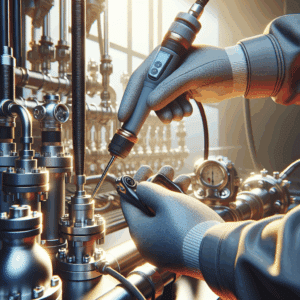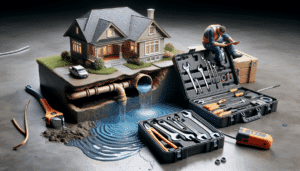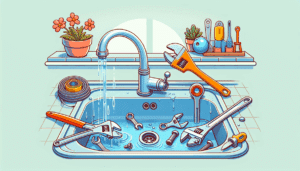As homeowners, we’ve all faced unexpected dilemmas with our water heaters. That’s where this guide from Gilbert Plumbing Company comes in, providing you with expert advice on tackling these common issues. Designed for homeowners eager to learn and empower themselves, we’re here to turn confusion into clarity.
Understanding Your Water Heater
Water heaters come in various shapes and sizes, each with unique components that need attention. Whether it’s a gas or electric unit, familiarizing ourselves with its anatomy will help us diagnose problems more efficiently.
Inside a water heater, you’ll find a thermostat, a heating element, a dip tube, and more. Together, we’ll unravel the function of these parts and understand how they interact to provide hot water seamlessly.
Common Water Heater Issues
Every appliance has its quirks, and water heaters are no exception. The most frequent issues include lack of hot water, unusual noises, and leaks. Recognizing these signs early can save us time and stress.
Addressing these problems promptly is essential. A noisy heater or inconsistent water temperature might seem trivial but could hint at underlying issues needing attention.
Tools You’ll Need for DIY Repairs
Embarking on a repair journey requires the right tools. While calling a professional is always an option, being equipped with essential tools can allow us to tackle minor fixes ourselves.
Key tools might include a wrench, a screwdriver, gloves, and a multimeter for those who handle electric units. These basic tools become invaluable in our repair toolkit.
Spotting Common Leaks
Leaks are among the most aggravating water heater problems, leaking precious resources and spiking our water bills. Spotting leaks involves examining connectors, valves, and the tank’s surface for moisture.
A proactive approach helps. By regularly checking these areas, we can spot and address leaks before they escalate, preserving both water and peace of mind.
Steps to Diagnose Your Water Heater Problem
Diagnosing issues with our water heater begins with understanding different symptoms. Knowing what to look for helps in identifying whether the issue is with the thermostat, the heating element, or elsewhere.
Start by checking for any leaks or irregularities in temperature. Once pinpointed, these observations will shape our next steps, ensuring accurate and efficient repairs.
Drain and Flush Your Water Heater
Maintenance is key, and draining and flushing the water heater regularly can enhance performance and prolong lifespan. Sediment buildup inside the tank often leads to reduced efficiency and potential problems.
Drain the tank at least once a year to remove any sediment. This simple step can significantly improve our water heater’s effectiveness, keeping it running smoothly.
Replacing a Faulty Heating Element
If our water heater struggles to maintain a consistent temperature, a faulty heating element might be the culprit. Replacing it is a straightforward task with the right guidance and tools.
First, turn off the power supply and drain the tank. Next, unscrew and replace the element, and finally, refill and restore power. This might sound daunting, but with care and patience, we can manage.
Understanding Thermostat Issues
Thermostats control the water temperature, and malfunctions can lead to too-hot or too-cold water. Checking the thermostat’s settings and ensuring it’s calibrated correctly is the first step.
If we still face issues, consider consulting with professionals for a possible replacement or readjustment, so our home remains comfortable without surprises.
Electric vs. Gas Water Heaters
Different types of water heaters have their unique troubleshooting paths. Electric models might face issues like faulty heating elements, while gas units could struggle with pilot light problems.
Understanding these differences aids us in diagnosing specific issues. It ensures we take the correct steps, or when in doubt, turn to experts for guidance tailored to our heater type.
When to Call a Professional
- Lack of Hot Water: If our water heater isn’t producing hot water, it could be a sign of a bigger issue that may require expert assistance.
- Frequent Leaks: Persistent leaks can lead to water damage, and it’s crucial to have professionals investigate and resolve the root cause.
- Strange Noises: Odd sounds can indicate sediment buildup or other internal problems. An expert can help pinpoint these issues accurately.
- Age of the Heater: Water heaters over a decade old might benefit more from a professional’s touch or even replacement advice.
- Repeated Problems: Persistent or recurring issues might suggest a need for professional intervention to ensure long-term solutions.
Conclusion
Mastering water heater repair is all about understanding and addressing problems as they arise. For personalized assistance, Contact Us at 480-535-0728 or Request a Free Quote today and let us take the hassle out of your hands!



